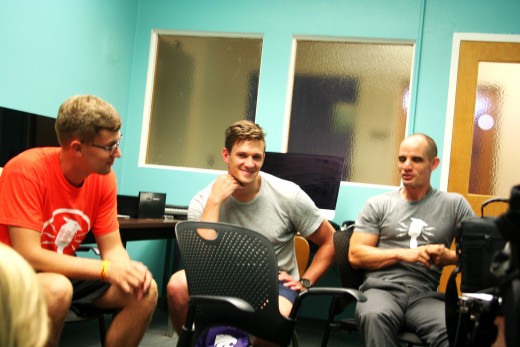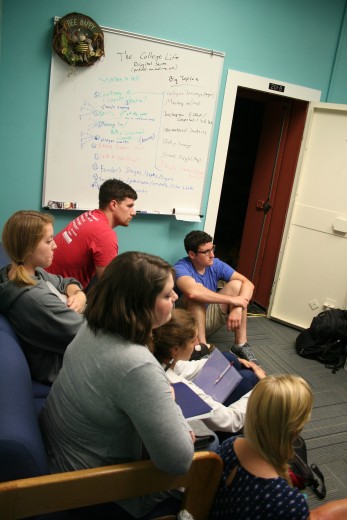Associate Professor of Anthropology at K-State Mike Wesch is determined to shake up traditional teaching methods and the ways faculty and students interact with and understand each other.

Wesch has been dubbed “the prophet of an education revolution” by the Kansas City Star and “the explainer” by Wired magazine. He was named an Emerging Explorer by National Geographic and has won several major awards for his work, including the US Professor of the Year Award from the Carnegie Foundation and the Wired Magazine Rave Award. His videos, which touch on issues of pedagogy and cultural understanding, have been viewed more than 20 million times, translated into 20 languages and are frequently featured at international film festivals and major academic conferences worldwide.
His latest project is a podcast, “Life101,” in which he seeks to tell the stories of college students through their own words and share their lived experiences in their own spaces. The goal? To lay bare the multifaceted, complicated, unique and ever-changing lives of modern students for a generation of faculty who are content to rely on Millennial stereotypes.
“The end game [of this research] is to allow all teachers and students to see past the stereotypes that lock us in to thinking this or that way about different people and about college life,” Wesch said.
“Life101” was inspired by Wesch’s desire to better understand the distance he perceived between himself and his students.
“It’s like a new generation shift,” he said. “For the first time, I was saying, ‘Oh, these kids today,’ and it really surprised me. I never thought I’d be that guy who said that…so I started just having open lunch with students to get to know them and learn who they are.”
The only rule Wesch insisted upon during these working lunches was “no small talk,” because the goal was to delve right into students’ deep thoughts and troubles. These conversations opened his eyes to the reality of the modern student experience.
“I remember thinking, ‘Faculty need to know this stuff, that students are a lot more complex than we think,’” he said. “Faculty need to know this so they treat their students better, value them more, respect them more.”
Before launching the podcast during the summer of 2016, Wesch explored the medium of digital animation.
Through animation, he was able to share people’s stories while keeping them anonymous. Plus, Wesch said, stripping away the visual characteristics of a person allows the storyteller to more fully develop the subject’s character.
“When you look at somebody onscreen, say, in a documentary, you fill in a lot of details about them based on how they look and how they dress,” he said. “I try to make them as anonymous as possible so people can just know them as people.”
The next logical step, he said, was to pursue an all-audio format, which allowed him access to student spaces from which cameras would normally be forbidden, such as fraternity parties and the roofs of campus buildings. The first episode of “Life101” documents his participant observation of these experiences and more, based on one of Wesch’s assignments for his anthropology students: to do fieldwork in an uncomfortable situation. He mentioned to his students that he hadn’t seen the hours of midnight to 2 a.m. for about a decade, and they offered to give him a tour.
Future episodes will continue to push boundaries toward redefining the traditional faculty/student relationship and public misconceptions about college students and the purpose of higher education.
“The alternative view is the one I’m trying to squeeze in there,” Wesch said, “that [in college] you’re trying to learn more than just a bunch of stuff. You’re learning your capacities, you’re stretching yourself.”
Wesch’s staff on the podcast consists entirely of student volunteers who enthusiastically support this mission.

“The way he teaches gives you a whole new perspective on life and just how truly beautiful it is,” said Joel Neises, 21, an anthropology major at K-State. “When he said he wanted to do a podcast series, I thought, ‘This would be a great way to get other people to understand how amazing the world actually is.’”
“Life101,” as a cutting-edge form of anthropological inquiry, is spreading quickly. Wesch said he is starting to work with teams at the University of South Florida and the American University in Cairo in Egypt to produce future stories for the project, while his own student team is eager to begin working.
“I hope to learn as much as I possibly can from people,” said Cody Chapin, 24, also an anthropology major. “I want to learn and understand as much as I can, their personality and their experiences in life so far.”
Volunteers can contribute in numerous ways, including: calling the “StoryMachine” at (785) 370-4329, which is anonymous answering service dedicated solely to recording content for future episodes; emailing a story or topic idea to mike.wesch@gmail.com; visiting the on-campus studio in Waters Hall 201; or even producing their own story (with training and assistance from Wesch and his team).
For more information on “Life101,” visit life101.audio or check out Wesch’s feature on the Chronicle of Higher Education’s Re:Learning podcast.
I love this idea. As a FarmHouse Fraternity Mom, I always thought people should hangs out with them for a few hours and renew their hope in our future! College students today may have a lot on their plate and they still give so much to those around them-developing lifetime skills as great citizens of a pretty exciting country!